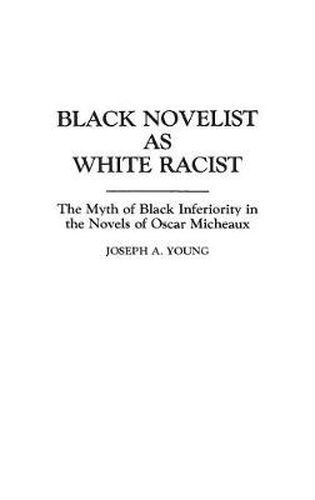Readings Newsletter
Become a Readings Member to make your shopping experience even easier.
Sign in or sign up for free!
You’re not far away from qualifying for FREE standard shipping within Australia
You’ve qualified for FREE standard shipping within Australia
The cart is loading…






In exceptionally close analyses of six novels by black writer Oscar Micheaux (1884-1948?) beginning with The Conquest, written in 1913, The Forged Note (1915), The Homesteader (1917), The Wind from Nowhere (1941), The Case of Mrs. Wingate (1945), and The Story of Dorothy Stanfield (1946), Young traces the development of Micheaux’s racial theories and of his stance as apologist for American imperialism. Young argues that these novels are examples of the detrimental effect of oppressive myths on early twentieth-century black behavior and values. The characters in the novels tend to mirror the black stereotypes of the post-bellum confederate romanticists, both the Cavalier racists and the Negrophobes. Adopting the world view of the oppressor required that Micheaux reject both his own blackness and that of his racial kinsmen. Along with many other black writers, Micheaux believed that to assimilate, blacks must learn to pass for white by adopting Anglo-Saxon values, myths, and philosophy. The novels make statements about life from a point of view that exaggerates the worst side of black character, perpetuating the myth of black inferiority that the black protagonists transcend. Young explores the influences of both Jack London and Friedrich Nietzsche on Micheaux’s heroes. Micheaux’s significance lies less as a figure of literary merit than as an especially graphic example of a black artist unwittingly espousing the beliefs of the oppressor rather than writing out of a truly black aesthetic philosophy. Ironically, Micheaux not only perpetuated racist myths in his novels, but was the victim of such myths as well. Between 1919 and 1948 Micheaux also wrote, directed, and produced over thirty films and was perhaps the most important Afro-American filmmaker before the Civil Rights Movement.
The only in-depth study of Micheaux’s novels, and one rich in period detail and insights into the evolution of black stereotypes as reflected in the novels of a black artist, Black Novelist as White Racist would be useful to students and teachers of Afro-American Literature and Plains and Western Literature, as well as to those interested in race theory, film history, and sociology.
$9.00 standard shipping within Australia
FREE standard shipping within Australia for orders over $100.00
Express & International shipping calculated at checkout
In exceptionally close analyses of six novels by black writer Oscar Micheaux (1884-1948?) beginning with The Conquest, written in 1913, The Forged Note (1915), The Homesteader (1917), The Wind from Nowhere (1941), The Case of Mrs. Wingate (1945), and The Story of Dorothy Stanfield (1946), Young traces the development of Micheaux’s racial theories and of his stance as apologist for American imperialism. Young argues that these novels are examples of the detrimental effect of oppressive myths on early twentieth-century black behavior and values. The characters in the novels tend to mirror the black stereotypes of the post-bellum confederate romanticists, both the Cavalier racists and the Negrophobes. Adopting the world view of the oppressor required that Micheaux reject both his own blackness and that of his racial kinsmen. Along with many other black writers, Micheaux believed that to assimilate, blacks must learn to pass for white by adopting Anglo-Saxon values, myths, and philosophy. The novels make statements about life from a point of view that exaggerates the worst side of black character, perpetuating the myth of black inferiority that the black protagonists transcend. Young explores the influences of both Jack London and Friedrich Nietzsche on Micheaux’s heroes. Micheaux’s significance lies less as a figure of literary merit than as an especially graphic example of a black artist unwittingly espousing the beliefs of the oppressor rather than writing out of a truly black aesthetic philosophy. Ironically, Micheaux not only perpetuated racist myths in his novels, but was the victim of such myths as well. Between 1919 and 1948 Micheaux also wrote, directed, and produced over thirty films and was perhaps the most important Afro-American filmmaker before the Civil Rights Movement.
The only in-depth study of Micheaux’s novels, and one rich in period detail and insights into the evolution of black stereotypes as reflected in the novels of a black artist, Black Novelist as White Racist would be useful to students and teachers of Afro-American Literature and Plains and Western Literature, as well as to those interested in race theory, film history, and sociology.